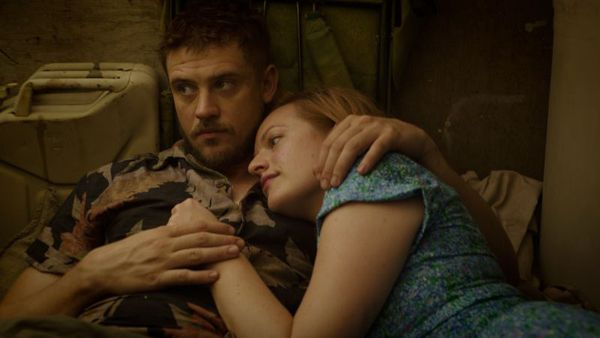Eye For Film >> Movies >> The Free World (2016) Film Review
The Free World
Reviewed by: Amber Wilkinson

This debut drama from Jason Lew, which starts in a familiar indie vein before making a surprising shift into Bonnie And Clyde territory, shows that he isn't afraid to take a few risks with audience expectations, even if it doesn't all pay off.
Certainly there's no missing his message as he paints the themes of redemption and reinvention in the filmic equivalent of 12ft high neon letters in his first few scenes, dropping us into the life Mo Lundy (Boyd Holbrook), an ex-con who is now working at an animal shelter, where the abused and homeless pups wear a thick coat of metaphor. Originally incarcerated for a crime he didn't commit, the treatment Mo received in jail resulted in him resorting to violence so extreme he became nicknamed Cyclops. On release, and now a convert to Islam - an interesting directorial choice that is depicted with restraint - he lives the life of a loner in a community that can't quite believe his innocence, with his tell-em-like-it-is boss (Octavia Spencer) instructing him to: "Bury the past or it'll bury you."
The arrival of a virtually rabid police officer (Stephen L Grush) accentuates the territory we are in - where supposed 'good' guys are bad and everyone else is nervous. In between verbally abusing Mo, he ditches a beaten dog at the shelter as his wife Doris (Elisabeth Moss) cowers like a hysterical wreck in his passenger seat. A day or so later, Mo finds Doris bloodied and disoriented at the shelter and, on impulse, decides to take her home. It's at this point which Lew's film begins to get into gear, with the earlier, rather cumbersome scene- and back-story setting giving way to more human, character drama as the petrified and confused Doris tries to weigh up whether to trust this man who lives in an apartment devoid of virtually anything save a matress or fear for her life.
Moss is required to be in such a state of histrionics in the first few scenes of the movie that it's initially hard to buy into her character, but once in Mo's apartment, her twitchy mix of anxiety and desire to find someone she can trust become much more believable. No sooner has a tentative romance begun to unfold, however, than Lew - who ought to take a leaf out of Mo's book and have a little faith in surrendering to a single idea - takes his characters on a fugitive road trip, complete with late-stage action scenes that beg unfortunate questions such as, why do none of the bad guys have a gun?
The film remains at its best in quieter moments, when Holbrook and Moss are given room to explore what it means to have a tentative desire and trust in someone you've not long met. While his narrative is over-written, Lew has an unfussy and measured directing style that offers promise and, when not hung up on wordy exposition, shows he can say a lot about a character visually, such as when we come to realise Mo has become so institutionalised that he sleeps in a closet. The film, like many debuts, suffers from too many ideas vying for attention, but Lew has crafted characters who we care about, suggesting better things to come in future.
Reviewed on: 19 Apr 2016














